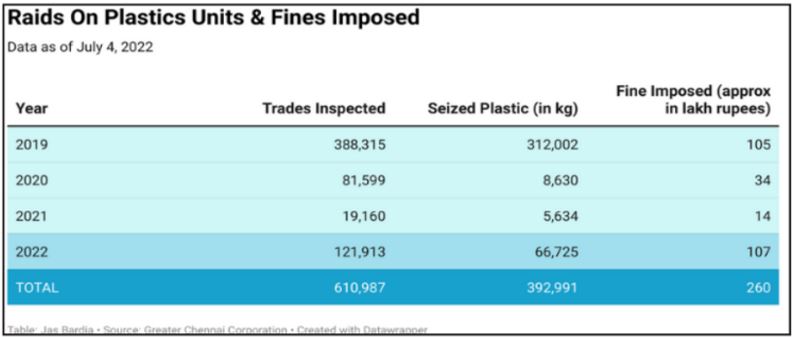Royapuram and Kodambakkam account for ₹34 lakh in fines, Chennai Corporation data reveals.
Jas Bardia| Aug 19, 2022

Greater Chennai Corporation (GCC) collected the most fines in the last four years from plastic ban violators in the first seven months of 2022. The Chennai corporation collected fines worth ₹1.07 crore from sellers of banned single-use plastics. It also confiscated 66,725 kg of plastics worth ₹1 crore, from 1.2 lakh raids in those seven months.
The Central government imposed a ban on manufacturing, hoarding and sale of 14 types of single-use plastics. There has been an increasing demand for such plastics due to the high cost of biodegradable alternatives such as paper and sugarcane bagasse, according to wholesalers in Chennai’s Georgetown and Koyambedu areas.
The ban resulted in single-use plastic infiltrating the State from Andhra Pradesh, Pondicherry and Daman and Diu, to meet the rising demand, said S Rakkappan, President of the Tamil Nadu Plastics Manufacturers Association. The plastics sold in Chennai’s Anderson Street are from those areas, he added.
Rakkappan said 50% of plastics are used for packaging and the authorities had cancelled licences of more than 1,500 shops dealing in plastic covers and packaging. These included vendors who legally got their licences.
More than 2,000 kg of banned plastic was seized from Koyambedu after the Centre’s ban, according to Shanthi S, Administrative Officer, Koyambedu Market Management Committee. “Plastic ban is imposed in their (trader’s/vendor’s) licence,” she said. Shanthi added that shopkeepers are informed of not using single-use plastic when the licence is given to them. She said surprise raids are conducted on shop owners and vendors which resulted in the usage of banned plastic coming down by 95%. Repeat offenders – those who violated the government order more than thrice – had to pay Rs. 11 lakh as penalty, she said.
Wholesalers and retailers lost revenue
Wholesalers and retailers in Chennai’s Parrys area and Anderson Street faced losses due to the ban. Rafi, owner of Banuu Stores in Anderson Street which sells plastic products said he would earn around Rs. 3 lakh from plastic sales before the ban but now earns around ₹80,000 per year. He would sell 100 cartons of plastic tea cups (1 carton = 10,000 cups) but now sells only 5-6 cartons of the biodegradable paper cups. “Only a limited number can be sold at the higher prices,” said Rafi.
Another plastic wholesaler in Parrys who does not wish to be identified said he posted sales worth Rs. 1 lakh per year selling banned plastics but now earns no more than Rs. 200 per day. “I cannot generate much profit because of the rent I need to pay for this shop and the people I hire,” he said, adding that he would have to fire staff if the ban persisted.
Vendors and small businesses hit
Tea-sellers and vendors of small shops in Chennai said they missed profits as they sold tea in paper cups that cost just more than Rs.1. The shopkeepers said this amount is five times more than plastic cups that used to cost 28 paise. This prompts them to revert to the use of banned plastic cups and covers.
The diaper covering industry has also been hit, says Rakappan, as manufacturers of diaper covers – most notably Ratna Packaging and Multiplex Packaging Industry — have had their licences cancelled. The manufacturers incurred losses worth Rs. 10 crore as regulatory bodies did not renew their licence due to Government Order (GO) 37 passed by the TN government, he added. GO 37 bans manufacturing, hoarding and sale of ‘use and throwaway’ plastics irrespective of thickness.
Ecosystem for alternatives
The government should provide alternatives to banned plastic, said Vamsi Shankar Kapilaval, Senior Researcher of Citizen Consumer and Civic Action Group, as those available are costly. He stressed the need for the State government to formulate alternative plans with small and medium enterprises, companies, small vendors, retailers and wholesalers (trader bodies). “Alternatives can’t compete with plastic cups,” he said, adding that the government has to facilitate this. The researcher said the plans have to be carried out on the same scale as that of plastics else the ban would be ineffective.
The Koyambedu MMC has installed vending machines across Koyambedu Market to discourage usage of single-use plastic.
The Tamil Nadu Chief Minister MK Stalin had also launched the ‘Meendum Manjappai’ campaign, wherein yellow cloth bags costing Rs. 10 are dispensed by the vending machine. The National Green Tribunal (NGT) in an order dated August 2, directed the Tamil Nadu government and the Tamil Nadu Pollution Control Board specifically to conduct awareness programmes on the disadvantages of plastics and their segregation in educational institutions. The NGT also asked the state government to provide alternatives to banned single-use plastic as sales continue to rise.
